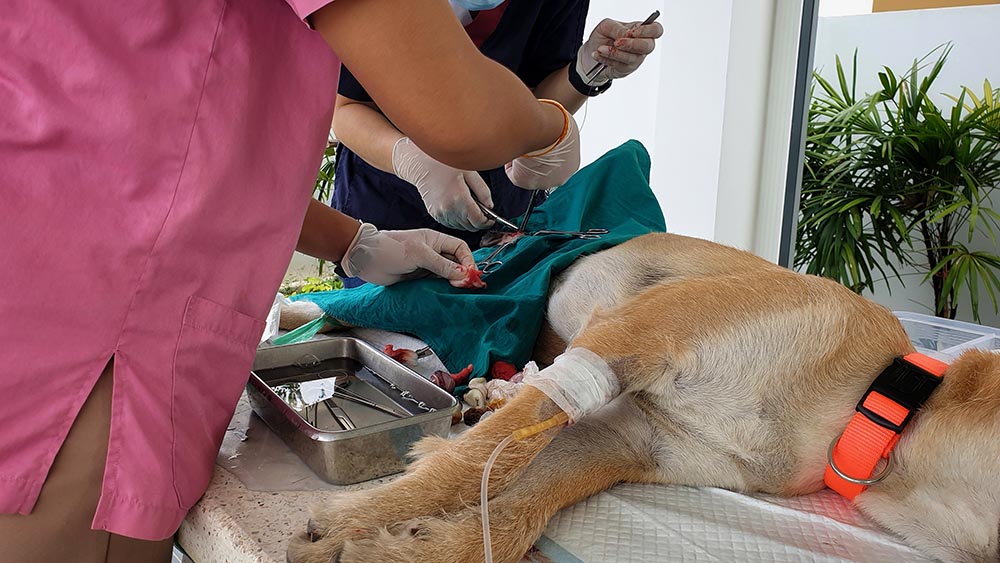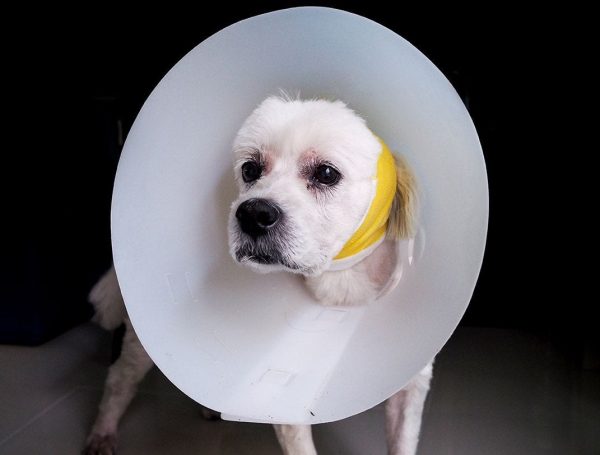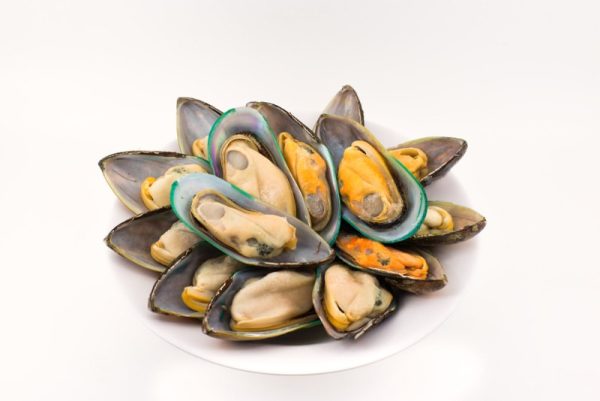In this article
View 4 More +As surgical and medical advancements are made, new technologies are developed. Historically, cutting during surgical procedures has been achieved with a scalpel blade. However, change is unavoidable, and CO2 lasers were first introduced into veterinary medicine in the late 1990s. We must also note that there are different types of lasers that can be used. So, when it comes to spaying or neutering pets with lasers, what do you need to know?
Below, we will explore the benefits of using the CO2 surgical laser specifically for traditional spay and neuter procedures and compare its use to that of the scalpel blade.

How Does It Work?
The surgical CO2 laser is a special instrument that helps surgeons precisely cut in surgical procedures. The term laser stands for “light amplification by stimulated emission of radiation.” The laser, which is shaped like a writing pen, emits an invisible beam of light at very high wavelengths. When the wavelength reaches soft tissue, the light is changed into heat, which results in photothermal ablation. Photothermal ablation is a fancy way of describing the rupturing of cells as a result of heat, which to the non-scientific community can be described as burning.
Where Is It Used?
Two common procedures performed in small animal veterinary medicine are the spaying and neutering of companion animals. Spaying is the term used for an ovariohysterectomy, the sterilization procedure used in female patients, in which the ovaries and uterus are removed. Similarly, in males, the most common sterilization procedure is neutering, or castration, the removal of the testicles. The spay procedure and the neuter procedure are performed the same way, regardless of the modality used for cutting.
The CO2 laser can be used throughout either procedure. Many clinicians use this modality to incise through the skin, fat, and muscle. Additionally, the laser is used to cut through blood vessels.
There aren’t many limitations as to what procedures benefit from the use of the laser, and the laser can be used in a variety of soft tissue procedures in general practice. Surgeries that often utilize the CO2 laser include mass removals, declawing, and other non-routine surgical procedures.

Advantages of the CO2 Laser
Overall, the use of a CO2 laser appears to improve patient healing time and comfort following routine procedures like spays and neuters. Additionally, the high temperatures emitted by the CO2 laser kill bacteria, reducing the chances of surgical infection.
- Cauterization of blood vessels as it cuts, minimizing bleeding
- Sealing of nerve endings as it cuts, lessening patient discomfort
- Less swelling due to the sealing of lymphatics
- Precise cutting

Disadvantages of the CO2 Laser
Although the laser offers many benefits, there are some downsides as well, most of which impact the veterinary team.
- Necessary added training
- Machine maintenance
- Cost of equipment
- Risk of secondary trauma to laser operators
- The necessity of safety parameters, including the use of goggles and a scavenger system to get rid of associated fumes
- Cost to client
Negative consequences of laser use impacting the patient are few, with the most common being slightly slowed healing immediately after the procedure when compared to the traditional use of a scalpel blade. Although tissue healing may appear delayed at first, 2-week rechecks between patients who had a laser method used in comparison to the scalpel showed no difference in healing.
Precautions must be taken for patients undergoing surgery with CO2 lasers. Tissue not being cut must be protected with saline-soaked gauze to prevent unwanted tissue trauma. And finally, the cost of the spay or neuter procedure may be slightly more if a CO2 laser is used.

Use of the Scalpel Blade in Spays and Neuters
Scalpel blades have been used for a long time to perform common surgeries like spays and neuters. Veterinarians are typically surgically trained to perform these types of procedures using the scalpel, and as a result, become very proficient. Due to the lack of specialized tools needed, non-CO2 procedures are readily available. Additionally, traditional approaches to spays and neuters may be more cost-effective than those using the CO2 laser.


Frequently Asked Questions
Is It Inhumane to Utilize Traditional Means of Spaying and Neutering?
Absolutely not! The laser can simply improve precision and has proven to have benefits for patients. It is important that adequate pain control be provided before and after any surgical procedure, regardless of the instrumentation used.
Why Does a Laser Spay Cost More?
The cost of a procedure completed by CO2 laser is often slightly more expensive due to the cost of laser ownership, maintenance, and training.
Summary
Spay and neuter procedures are very common in general practice. Although considered routine, care must always be taken during these surgeries to ensure patient safety and recovery. The use of a CO2 laser can benefit patients by minimizing inflammation, pain, and bleeding associated with the surgical procedure. The CO2 laser can be utilized in just about any scenario that the traditional scalpel can be used. The cost of surgical procedures may also be slightly higher when the surgeon utilizes the CO2 laser; however, this may vary based on the practice.
Featured Photo Credit: SeventyFour, Shutterstock


















